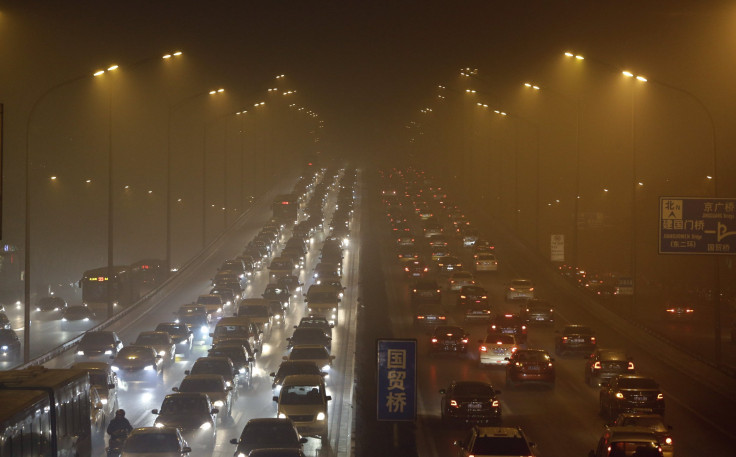Beijing Pollution: New Measures Require Cars To Alternate Driving Days In Heavy Smog

Imagine waking up at eight, expecting to drive for half an hour to work, only to find out that you are not allowed on the road today and having to scramble to extremely crowded buses or subways to get to work. This is what residents in Beijing will have to do under new guidelines that are meant to alleviate Beijing’s ongoing “Airpocalypse” smog problem.
The new emergency response system will require alternate driving days for cars with even- and odd-numbered license plates in case of lingering smog, Xinhua, China’s official state news agency, reported on Thursday. When the city issues a red alert, the most serious level, under a four-tiered pollution warning system -- that is, when the air quality index (AQI) is expected to be more than 300 over a three-day period -- the Beijing Municipal Heavy Air Pollution Emergency Response Program will be initiated.
The response program also dictates under the red alert that 30 percent of government cars of various levels will be halted, and that kindergartens, primary schools and high schools will be suspended to protect the health of the city’s youth. To funnel the additional 2 million people who would have to resort to public transportation on such days, buses and subways will run more frequently with expanded hours of service, according to the city’s Environmental Protection Bureau.
The measures were passed on Wednesday at the meeting of the Standing Committee of the Beijing Municipal Committee of the Communist Party of China, Xinhua reported.
Vehicle exhaust fumes are among Beijing’s top sources of air pollution, according to a report from the Chinese Academy of Sciences, contributing 22.2 percent of PM 2.5 particles, a dangerous particulate, in the city. The second-largest polluter -- industry and manufacturing -- will also be addressed by the response program. Industrial plants in the city will be ordered to halt or reduce production to curb emissions under the program, and building construction, fireworks and outdoor barbecues will be prohibited if an orange alert, the second-highest level with an AQI between 201 and 300, is issued.
Pollution control has become one of the Chinese government’s top priorities this year, as Beijing’s AQI surpassed 900 at one point, 40 to 45 times above recommended safety levels, forcing the government to finally acknowledge the severity of its problem, NBC News reported.
Measures currently being tested across the nation include a carbon exchange program that allocates an emission ceiling to companies in high-polluting industries, a monthly list of the 10 most polluted cities and financial incentives up to 5 billion yuan ($818 million) for local governments to effectively combat pollution.
© Copyright IBTimes 2024. All rights reserved.











